 A voter filed a complaint with the Providence Board of Canvassers alleging her mail ballot was tampered with by supporters of Rep. John DeSimone, an incumbent legislator who lost in the Democratic primary for the District 5 House seat and is subsequently staging a write-in campaign.
A voter filed a complaint with the Providence Board of Canvassers alleging her mail ballot was tampered with by supporters of Rep. John DeSimone, an incumbent legislator who lost in the Democratic primary for the District 5 House seat and is subsequently staging a write-in campaign.
Joanne St. Lawrence, who is 55 years old, disabled and does not drive, said three people came to her home on Phoebe Street to collect her mail ballot. She was expecting someone from the campaign of her preferred candidate, Marcia Ranglin-Vassell, who upset DeSimone in the primary. Instead, St. Lawrence says she was greeted by DeSimone supporters.
“They asked me if I had filled in for John DeSimone,” St. Lawrence told RI Future. “I said no. They said, ‘did you vote for Marcia?’ I said yes.”
That’s when one of them asked St. Lawrence for an eraser, she said. When erasing her ballot failed – St. Lawrence filled it out in pen – one of the people, “took it and wrote his name in. They had me sign it and they both signed it,” St. Lawrence said.
She said she knew something wasn’t right, but didn’t know how to stop the people from changing her ballot. “I wasn’t thinking clearly,” St. Lawrence said. “I just woke up.”
“I’m really concerned about this,” she told RI Future. “My vote is supposed to count.”
The Providence Board of Canvassers confirmed St. Lawrence filed a complaint with their office Wednesday. Kathy Placencia, the administrator of elections for the board, said she sent the complaint to the state Board of Elections. The state Board of Elections declined to comment. Bob Rapoza, the acting director, did not return several phone calls over several days.
St. Lawrence said she was told the Board of Elections would consider her complaint today. While the Board does meet today, no agenda lists her complaint specifically. An agenda says the Board will meet today at 2pm and “may” certify mail ballots. The agenda says, “Any individual seeking to represent a candidate or party during the mail certification process must submit written authorization from the represented party or candidate prior to appearing before the board, pursuant to Rhode Island General Laws Section l7-22-2″
UPDATE: Rapoza returned RI Future’s call shortly after this post was published. He said the complaint process will start at the Providence Board of Canvassers. He said his office did receive a copy of the complaint from the Board of Canvassers. “I have no comment on how this would work at this time,” Rapoza said.
On the advice of the Ranglin Vassell campaign, St. Lawrence said she plans to request a provisional ballot on election day. “If my [mail] ballot doesn’t show up, they have to take that,” St. Lawrence said. “So hopefully it doesn’t show up or hopefully they will see that it was changed.”
She said she is also considering filing criminal charges. The people who took her ballot signed it as witnesses, St. Lawrence said, but she does not know if they signed their actual names.
St. Lawrence said she is supporting Ranglin-Vassell because “she’s on the same level as a lot of people in the neighborhood. I don’t know who this John DeSimone is.”
]]>
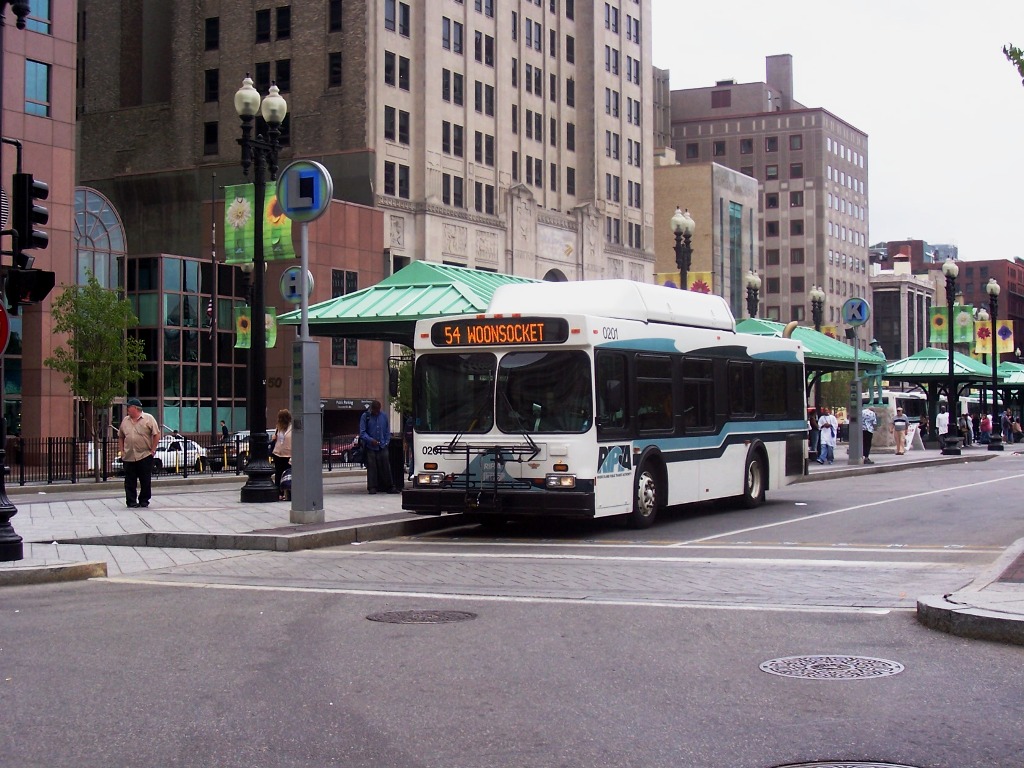 Have you heard about the $17 million “Downtown Enhanced Transit Corridor” grant that the city of Providence received for the Rhode Island Public Transit Authority to develop a 6-stop enhanced bus corridor to run from the Providence Railroad station to a new bus hub in the hospital district? Its largely the route originally planned to be for a streetcar.
Have you heard about the $17 million “Downtown Enhanced Transit Corridor” grant that the city of Providence received for the Rhode Island Public Transit Authority to develop a 6-stop enhanced bus corridor to run from the Providence Railroad station to a new bus hub in the hospital district? Its largely the route originally planned to be for a streetcar.
RIPTA is organizing a “stakeholder” group to advise on implementation, the first meeting of which is scheduled for October 24. The RIPTA Riders Alliance, of which I am a member, was invited to participate. An open public meeting for all may be scheduled later.
$17 million should be enough to be a potential game-changer for downtown and for RIPTA, both of which are struggling. Indeed RIPTA ridership has dropped significantly in the last 2 years, from about 20 to 18 million riders. Not long ago the RIDOT Director publicly called RIPTA a “failure” because of our low commute by transit rate. The decision by Citizens Bank to locate a huge corporate “campus” west of I-295 where there is no transit is an indication of how little RIPTA can matter to employers. Downtown is hurting too, from the long empty “Superman” building to the well publicized perception of unpleasant conditions and “chaos” in Kennedy Plaza.
RIPTA planners have said they intend to use the $17 million grant to jazz up the bus stops with enhanced amenities, to buy some ultra-clean hybrid buses, and have six of their lines (#1,3,6,51,58,72) routed on the
corridor to ensure very frequent service.
While this includes some good ideas, at $2/ride, soon likely to be $2.50, I don’t see how this will attract many new riders who don’t already have a pass or ride free anyway. I don’t see how this expensive fare will do much to attract attention of those wanting to do business that might lead to economic redevelopment. Thus I suggest that the buses RIPTA wants to buy be used to establish a free loop on that corridor.
About a year ago the Coalition for Transportation Choices hosted a meeting here with invited speakers from Denver, Minneapolis and Hartford where transit initiatives were successful in building ridership and spurring economic development. One thing Denver and Hartford (New Haven too) did to help do this was to institute a free bus shuttle connecting their train stations, also on the periphery, to key central locations. So this can be done! I’ll also add that having lived in Oregon 1974-75 when Portland OR was considered a failed city with a dead downtown, one thing they did, (Seattle too) to turn things around was to institute a fare-free downtown zone to get people more used to using transit and to come downtown where they can get around easily. This was a great success even if it could not be sustained through the 2008 recession.
Not just those that love cities, we all have a stake in having our central city and transit system succeed as they have so much potential to contribute to the problem of combating climate change.
Those who think this is an idea worth exploring need to encourage RIPTA to reconsider. Operating funds for the shuttle is a problem, but if there is a will to do so perhaps Federal “CMAQ ” funds can be reprogrammed for this purpose, at least for a few years. (CMAQ helped support operating the old Providence-Newport ferry and the South County commuter rail.) After the bad publicity on Kennedy Plaza, both for the buses and the city, something needs to be done to get positive attention. And a free shuttle will help strengthen the value of our Northeast Corridor location and commuter rail access TO Providence, from the north and south.
This project, together with enhanced policing and better services for the homeless and mentally ill in the Plaza, can begin to turn the situation around for the better. For reasons of environment, economy, and quality of life, and for those who love cities, we don’t want to squander this opportunity created by this grant to make a real improvement on our economy, environment, and quality of life.
]]>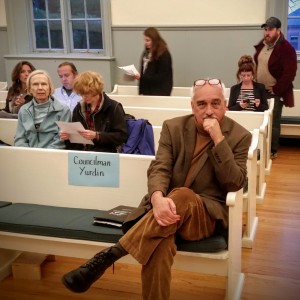
Steve Brown, the executive director of the Rhode Island ACLU has issued a statement regarding Providence City Councillor Kevin Jackson’s lawsuit against the two people, Patricia Kammerer and Karina Holyoak Wood, who have organized a recall effort and petition against him.
Jackson’s lawsuit also names the City of Providence and the Providence Board of Canvassers.
“The ACLU is not familiar enough with the mechanics of the City’s recall mechanism to comment on the specifics of the allegations contained in Councilor Jackson’s complaint,” said Brown in the RI ACLU statement, “We do agree that certain due process standards are essential before subjecting elected officials to the burdens imposed in having to defend themselves against removal from an elected position they obtained through a democratic process.
“At the same time, we are deeply troubled that, in addition to suing City officials and the Board of Canvassers, which is responsible for overseeing the recall petition process, the lawsuit names as defendants the two private individuals who have been involved in mounting this recall campaign. Their involvement in the suit is completely unnecessary in order for a court to address any legitimate due process concerns raised by the petition process. Thus, the inclusion of these two individuals as defendants strikes us a classic SLAPP suit – an attempt to silence private citizens for seeking to exercise their First Amendment right to petition government.
“As Rhode Island’s SLAPP suit statute notes, ‘full participation by persons and organizations and robust discussion of issues of public concern before the legislative, judicial, and administrative bodies and in other public fora are essential to the democratic process.’ These two Providence residents should not be forced to defend themselves in a court of law for exercising petition rights granted them by the City Charter. The ACLU urges Councilor Jackson to amend his complaint and remove these two private citizens as defendants.”
In a statement the Kammerer and Holyoak Wood called Jackson’s lawsuit “an obvious delaying tactic.” Holyoak Wood was the campaign manager of Marcus Mitchell, who ran an unsuccessful write-in campaign against Jackson two years ago.
]]>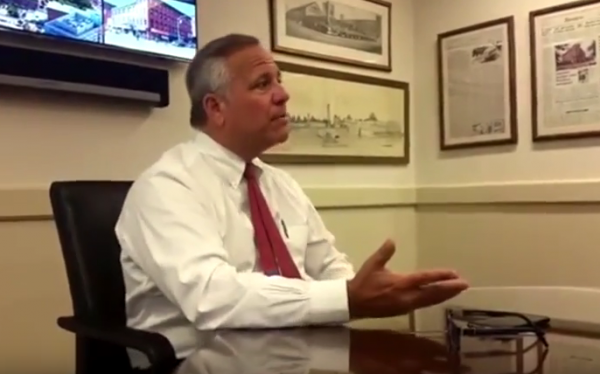 Some of the landlords who own downtown Providence, and some of their allies, have decided that Kennedy Plaza and its surrounding area would become much more valuable real estate if they could cause the bus depot and all of the low income people who are drawn to the bus depot and/or the city center in general, to disappear. Seems former mayor Joe Paolino decided that he no longer cared about the community, he wanted more valuable properties, so he started a campaign against the poor.
Some of the landlords who own downtown Providence, and some of their allies, have decided that Kennedy Plaza and its surrounding area would become much more valuable real estate if they could cause the bus depot and all of the low income people who are drawn to the bus depot and/or the city center in general, to disappear. Seems former mayor Joe Paolino decided that he no longer cared about the community, he wanted more valuable properties, so he started a campaign against the poor.
Every rational person in Rhode Island then told Mr Paolino that his plan was very strange as it went against all constitutional law and common sense. But in the very weird world in which nearly all public policy decisions are made by and for the people with a lot of money, I guess he became so out of touch with reality that he thought it made some kind of sense.
There are several major flaws in Joe Paolino’s proposal. Some of which have come out in the public discussion, some that need lots more exploration.
We need a real plan to end poverty, because no matter what you do, low income people are drawn to city centers. This is a hard and fast rule that is as old as cities themselves, 8,000 to 10,000 years. When people have almost nothing, when they are displaced from their land, conquest or mechanization have the same effect, or the factories have closed, the only place they can go is to the city. Elites can try to move them around the city, but all that does is move them, it does not end the poverty or the magnetic attraction cities have for the displaced. Mayor Elorza and all of the advocates are right, it’s a phony plan without jobs or even a whiff of a brighter future for the people being moved around so landlords can claim bigger depreciations.
In the future, a bus hub right downtown is going to be more critical to our survival than it is now. Instead of marginalizing transit to reduce our climate footprint and keep Providence above sea level, Providence needs to eliminate almost all automobile entrance to the city and get everyone riding transit, biking, boarding, or walking. Mr. Paolino has not considered the climate implications of his monstrosity, or maybe he does not care. But in any case, the bus hub belongs downtown, and you sound like a scoundrel wanting to push low income people away from your real estate properties and into someone else’s neighborhood, making it harder for people catching buses.
But you have already heard those points from others. What you are not hearing is that your economic development strategy is self defeating. An economy based on the needs of the real estate, finance, and insurance industries (you know, the FIRE that burned down the economy in 2008) is guaranteed to swing wildly between bubble and bust while pumping up the assets of the landlords and the banks, and displacing many other people. Piketty has made it quite well known that the greater the inequality in your community, the less well the economy will perform. Economies that have reached the point where real estate redevelopment is the underpinning of other economic activity are in big trouble. They become the early adopters of being a place with no work for most workers. So, they try to displace them away from their properties. But, as the inequality and the end of jobs as we know them further displaces people, as you get more climate refugees, you get more people (and water) flooding downtown right onto the very properties you want more money from.
It is time for economic development from the bottom up. We cannot rely on churning buildings downtown to create jobs for the people who do not have one. We can not rely on the wetlabs, communications businesses, dirty industry infrastructure, and app developers to create jobs for the people who need them, as they never will. The meds and eds strategy creates only a small number of jobs, most of those higher paying jobs, mostly to be filled from away, while creating few for the people already here. In other words displace the poor and have many more join those already on the streets is exactly what is intended, as it is the only way for the rich to steal more as the global economy and ecology strangle and overheat. There are now people asking for money at every street corner, people who feel permanently displaced from the economy.
The answer to our woes is not more concentrations of wealth, though that is the preferred economic development strategy these days. So maybe I am pissing into the wind. But the wall is cracking in the face of the resistance. We are not letting you build any more fossil fuel infrastructure whatsoever, and we are going to stop the running of economies to benefit the landlords of downtown and the bankers. We want clean power and we need democracy. When real estate and finance rule, the people suffer. The debts choke an economy, causing it to squander resources.
A most excellent way to understand the difference between the preferred solutions of the 1% and reality is to compare business climate rankings with various measures of the strength of an economy. No actual study has ever found a correlation between business climate rankings and economic performance. None. No study has ever found a correlation between strong environmental regulations and weak economic performance. None. Piketty demonstrated that inequality harms economic performance too. You want an example? How about Rhode Island. We get the worst rankings in the business climate indexes, but if you look at economic performance we are pretty close to the middle in growth rates, median income, and other performance based evaluations, and hardly a week goes by without the quality of life and new business start up culture being highlighted in the national media.
In other words on balance what the state and other institutions are doing to promote the profits of the 1% is harming us. Cutting taxes for the rich is useless for everything except lining their pockets and causing cities to neglect basic infrastructure. It does not help us systematically end poverty or stop climate change. Trickle down economics is like getting peed on. Which is why there are more and more efforts to restrict democracy and corral the people. Which is why the resistance grows. Daily and on many fronts simultaneously.
The former mayor, Governor Wall Street, the funders of the political machines that pull the strings on Smith Hill; they are all in need of some education on where the economy is going to go and why as the climate crisis rolls on and economic growth slows with the destruction of the resource base and greater “natural” disasters. The future is going to be more locally self reliant. We are going to locally generate renewable clean power. We are going to grow more of our own food. Our transport systems will be less automobile oriented. And the FIRE industries will not be allowed to burn down the economy again. If your plans to revitalize downtown do not take these things, including a slowing of economic growth, the odds of success are pretty slim.
]]>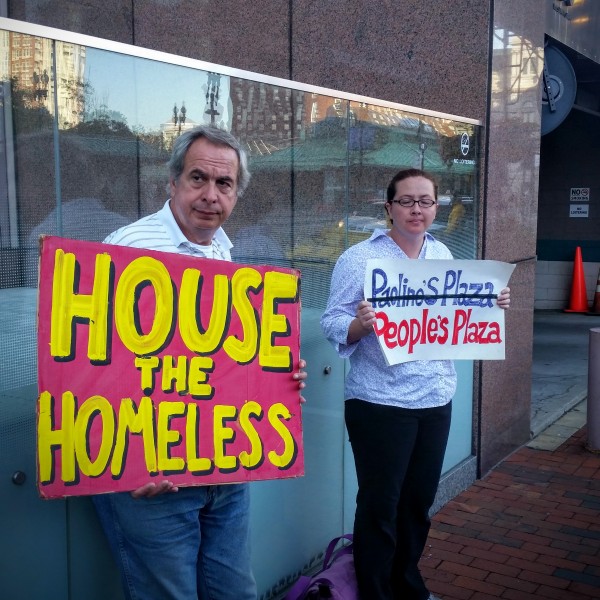 The issue of panhandling in Providence has been the subject of news articles, opinion columns and letters to the editor. The recent letter from Bishop Tobin and comments from Joseph Paolino, chairman of the Downtown Improvement District motivate me to present some alternative views.
The issue of panhandling in Providence has been the subject of news articles, opinion columns and letters to the editor. The recent letter from Bishop Tobin and comments from Joseph Paolino, chairman of the Downtown Improvement District motivate me to present some alternative views.
I applaud the efforts of the Downtown Improvement District’s (DID) willingness to convene a range of stakeholders to look for solutions to the increase in panhandling and vagrancy. It will certainly require a robust and sustained public-private partnership to address these issues.
But I am concerned with the notion that there is a quick fix solution, or that one more service program will provide the answer. Before jumping to solutions, I believe it is essential that we ask ourselves: Why? What are the underlying reasons for panhandling and vagrancy in our community?
Changes in the enforcement of the law explains the visibility of panhandling, but poverty is the root cause. Over 14 percent of Rhode Islanders live in poverty today. Given these numbers, the dearth of affordable housing, the lack of adequate mental health care and low wage jobs that don’t allow workers to earn enough to support themselves and their families, it is surprising that this has been underground for so long.
It makes us uncomfortable, and it should, to encounter so many people in our public spaces who seem to have no place to go and are struggling with mental health issues and/or addictions. These are our neighbors, they are suffering and we don’t know what to do. But the solution is not to empower police to move these people out of sight so that others can enjoy a “clean, safe city.” I am not saying, that police should not intervene when law-breaking occurs. I am saying that our efforts to address these issues should not focus on criminalizing people who are poor, homeless or mentally ill by depriving them of their rights to congregate in public space, to engage in conversation, or just enjoy the outdoors.
The Scripture I know teaches us to leave the corners of our fields and the gleanings of our harvest to the poor and to open our hands and lend to people whatever it is they need. We learn that helping fellow human beings in need is not simply a matter of charity, but of responsibility, righteousness, and justice. The Bible does not merely command us to give to the poor, but to advocate on their behalf.
I call upon business leaders, public officials and all of us to act with wisdom and compassion, to focus on the larger structural issues of poverty. And I hope that any proposed interventions are sustainably funded, based on models of best practice and built with inclusive community participation.
Rabbi Alan Flam is the executive director, Helen Hudson Foundation for Homeless America.
]]>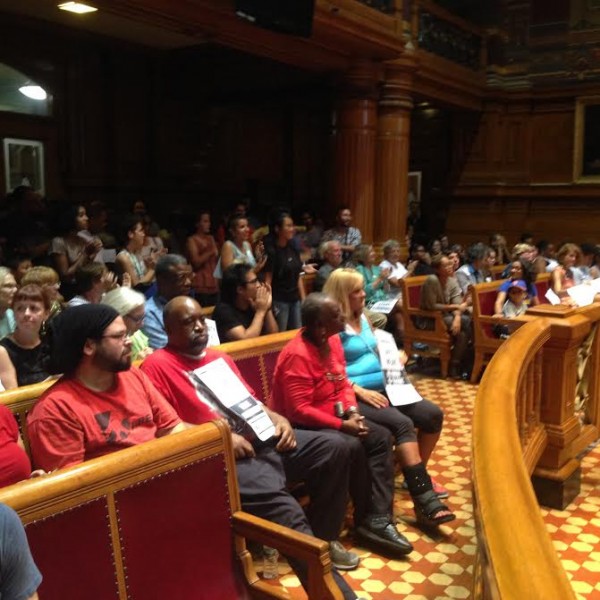 The Community Safety Act, a citizen-proposed ordinance that would address racial profiling and other abuses of power by police, was heard by the Ordinance Committee of the Providence City Council last week. While only six members of the council attended – Council President Luis Aponte, Kevin Jackson, Michael Correia, Sam Zurier, Mary Kay Harris and Bryan Principe – at least 11 community members spoke to the importance of making it law.
The Community Safety Act, a citizen-proposed ordinance that would address racial profiling and other abuses of power by police, was heard by the Ordinance Committee of the Providence City Council last week. While only six members of the council attended – Council President Luis Aponte, Kevin Jackson, Michael Correia, Sam Zurier, Mary Kay Harris and Bryan Principe – at least 11 community members spoke to the importance of making it law.
Two city councilors – Mary Kay Harris and Kevin Jackson – spoke in favor of the proposed ordinance.
Vanessa Flores-Maldonado, campaign coordinator for the effort to make the CSA law, chastised the members of the city council who didn’t attend the meeting and said, “the whole community is noticing what is happening here.”
A young man told a story about the time a Providence police officer profiled him based on his skin color, when he was 16 years old.
Stephen Dy, an organizer with the Providence Youth Student Movement, told of the time a Providence police officer took his and his friends’ photos to be added to the department’s gang database because they visited a friend on home confinement. Dye said he tried to refuse to have his picture taken, but the officer threatened to take his friend to jail unless he acquiesced.”
“I felt trapped,” Dye said. “I didn’t want my friends to be locked up, so I cooperated. We were being divided. We were losing in a war we never even knew we were in.”
John Prince, an organizer with Direct Action for Rights and Equality, told of the time Providence police prevented him from recording an incident and entered his home without permission (which RI Future covered at the time.) “You gonna tell me I should feel safe around police?” he said. “I don’t feel safe around police.”
A Spanish-speaking man said Providence police should use interpreters if they need to communicate with those who don’t speak english as their first language. “Police shouldn’t act as if they are ICE officials,” he said, noting that local police are not charged with enforcing immigration laws.
Many of the speakers were Providence residents of color who had experience being harassed or treated unfairly by Providence police.
Sophia Wright talked about the need to allow people to choose the gender of the person who frisks their body. “When somebody stops you on the street and puts their hands on you … we don’t need to be reliving traumatic experiences,” she said.
Hillary Davis, a policy expert with the ACLU, said the CSA is “common sense and completely necessary.”
Martha Yager, of the American Friends Service Committee of Southeastern New England, spoke about prohibiting the use of private cell phones by the police for work purposes. “We do insist there needs to be better policies on all equipment,” she said. “We want to prepare for the use of personal cell phone for work purposes and establish the following standards for any recording devices whether dash cam, body cam or recording phones.”
Randall Rose, of the Rhode Island Coalition for Human and Civil Rights, also spoke about unregulated surveillance by Providence police. “There hasn’t been a lot of accountability,” he said. “There hasn’t been the ability of the public to see what police and other forces are doing with the information that they collect.”
“We believe this policy,” said Deborah Wray, “will improve the quality of life for citizens.”
Special thanks to Carlos Romero for the video.
]]>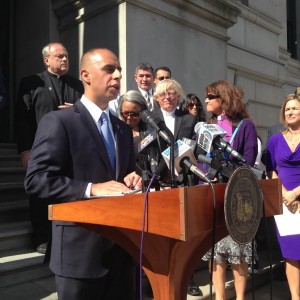 One day after a botched press conference on a similar subject, Providence Mayor Jorge Elorza brought together a big group of state and city officials, as well as advocates and activists, to announce a new plan to address panhandling, poverty and homelessness in downtown.
One day after a botched press conference on a similar subject, Providence Mayor Jorge Elorza brought together a big group of state and city officials, as well as advocates and activists, to announce a new plan to address panhandling, poverty and homelessness in downtown.
“As we see increased homelessness and increased panhandlers, this is a moment to look inside ourselves and ask ourselves what kind of community we want to be,” Elorza said, speaking from atop the steps at City Hall. “Do we want to be the kind of community that cuts resources for mental illness or fails to invest in homeless shelters, or cuts resources for legal services for the indigent? Do we want to be a community that is not complacent in the face of inequality of income and wealth? Do we want to be a community that invests in affordable housing? Do we want to be a community that believes in workforce opportunities? And do we want to be a community that works to address the persistent challenges of racial injustice?”
He added, “We are not interested in simply relocating the issue. We are looking for lasting solutions that balance the rights of the people of our city. We are not going to benefit by pushing people from one street to another. What we are announcing here today is not just a plan. What we are announcing here today is an approach to work collaboratively, compassionately and creatively to make sure that no resident of our city or of our state ever gets left behind.”
Elorza said the city will open a day center for homeless people, provide financial support for Amos House “A Hand Up” program, a jobs program for people who are homeless and/or struggling financially, and offering support to Emmanuel House’s program for helping people with substance abuse problems. Police presence has already been increased in downtown – and Public Safety Commissioner Steve Pare said arrests have increased – and parking meter-like machines will be located downtown so people can give to social services rather than directly to another human being.
“Most importantly,” said Elorza, “we will work with a broad coalition to advocate for the critical resources to provide for mental health, substance abuse, legal services and housing supports to our families and people in need – resources and funding we’ve seen reduced in recent years.”
While Paolino’s press conference yesterday relied heavily on the business community, Elorza’s event featured several state and city elected officials. In attendance were state legislators: Maryellen Goodwin, Josh Miller, Edie Ajello, Aaron Regunberg and Grace Diaz as well as city councilor Mary Kay Harris, Wilbur Jennings, Brian Principe and Michael Corria.
“What we are talking about is ‘One Providence’,” said City Councilor Mary Kay Harris, who represents downtown Providence, echoing the Elorza’s campaign theme. “One Providence includes the rich and the poor. It includes the poor working class and the workers altogether.”
Eileen Hayes, the director of Amos House who champions the plight of people who are homeless, said, “Our fellow citizens are struggling, especially those who are homeless and do not have the financial resources to care for basic needs. Every single business community should find a way to offer a job to homeless person who wants to work. They are good people and they are good workers. We believe that we cannot criminalize behaviors based on people doing the best they can to survive without offering viable solutions including jobs and housing.”
While Paolino’s press conference was held at the Convention Center and was invite only, Elorza’s was the steps of City Hall. Both were disrupted – Paolino’s by angry activists and journalists who couldn’t attend and Elorza’s by a woman who said she needs more social services. Elorza’s press event featured activists who advocate for the homeless, while Paolino’s expressly kept many advocates from attending.
When Elorza was asked if he wished Paolino and more members of the business community attended his event he said, “I’ve had many members of the business community reach out and express their support for what we are doing and I look forward to continue working with anyone who truly wants to address the long term root cause issues.”
]]> Mayor Jorge Elorza bikes to work everyday, and takes part in frequent night rides with community members. By all accounts the mayor is supportive of bicycling. However, Providence has made next to no progress on bike infrastructure during the two years the mayor has been in office. This needs to change.
Mayor Jorge Elorza bikes to work everyday, and takes part in frequent night rides with community members. By all accounts the mayor is supportive of bicycling. However, Providence has made next to no progress on bike infrastructure during the two years the mayor has been in office. This needs to change.
Providence has seen the mayor step up on some issues, and his vocal leadership has had an effect. Just recently, Mayor Elorza spoke eloquently to the harm of liquefied natural gas (LNG) power plants, a move which put him in direct contradiction with Governor Raimondo. This move came after the Sierra Club of Rhode Island challenged the mayor to speak up clearly on the issue. I am making the same request.
Where is the bike infrastructure, Mayor Elorza?
We cannot expect mass cycling to take root in Rhode Island without our core cities establishing bike routes that are suitable for eight year olds, 80 year olds, and everyone in between. If we’re going to provide routes that are safe for people in wheelchairs and rascals, we need bike routes, like what the Dutch and Danish have. Doing this can help us make more efficient use of our school bus funding, our sidewalk funding, our parking, and improve business outcomes for small business.
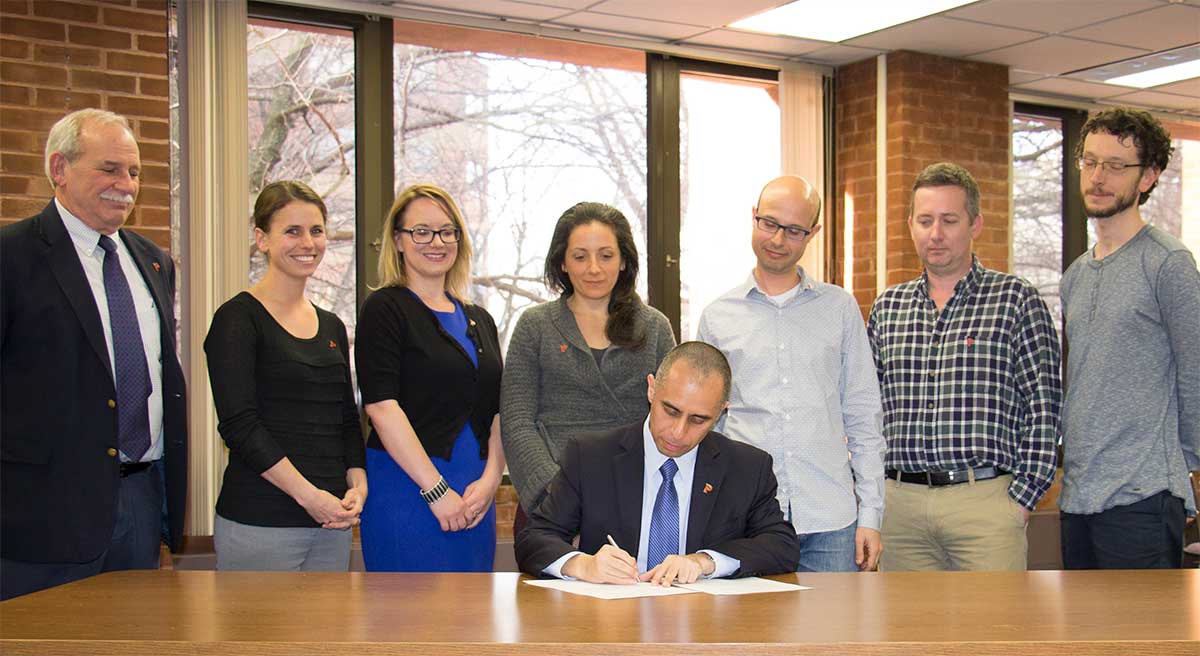
The mayor has pushed some reform. The city’s Bicycle and Pedestrian Advisory Commission currently receives advanced notice of city street projects, and its review of those projects has brought piecemeal changes to sections of street as they’re repaved. Many project reviews include only tiny sections of street, and nothing has yet been accomplished beyond paint, either through door-zone bike lanes, or even worse, sharrows. But this is not enough. To be frank, if Providence is not going to become a charming patch of shallow ocean in the next century, we need concerted action now.
What do community members demand?
A demand is a challenge that comes as an honor only to those politicians who warrant it. Mayor Elorza has objectively not accomplished what needs to be accomplished in his first years of office, however, he has demonstrated himself to be someone who, with pressure, might accomplish those goals. Be honored, Mayor Elorza. You’re being called to the challenge.
The mayor must work to design a full network of protected bike lanes on the major arterials of the city. A starting point for this would be 50 miles of infrastructure, which we estimate would take only 3% of on-street parking to achieve.
The mayor must also work to create “bike boulevards”- routes that are low-traffic and low-speed, off of the major arterials. These are not substitutes for protected bike lanes, which are needed to reach jobs and shopping opportunities in commercial areas, but they are majorly important improvements to help make our neighborhoods safer for school children.
The mayor’s office has been supportive of remaking the 6/10 Connector as a boulevard, but as yet has not sought public conflict with RIDOT and the governor’s office about their intransigence to community needs. We need the mayor to pick this fight, in a direct way, just as he did on LNG. It’s understandable that the mayor wishes to advocate behind the scenes, but what will bring life to this issue is a top official speaking openly about the poor priorities RIDOT is putting forward. Without that, the 6/10 Connector continues to take a back-burner position in the news cycle. Speak up, mayor! Put the state government on notice!
These projects must be funded. The city’s $40 million bond includes transportation and non-transportation priorities, but among transportation priorities only 17% of funding is going to non-car priorities, mainly sidewalks. The city must spend in proportion to its population of non-car owners (22%), and it must make good use of those funds to make sure that biking is considered a high priority.
We’ve seen you act before, mayor. We have faith in you. Step it up! We need you to take action. The bike rides aren’t enough. We’re here to vote for you and to back you up when you are ready to do this.
It’s time.
~~~~
]]>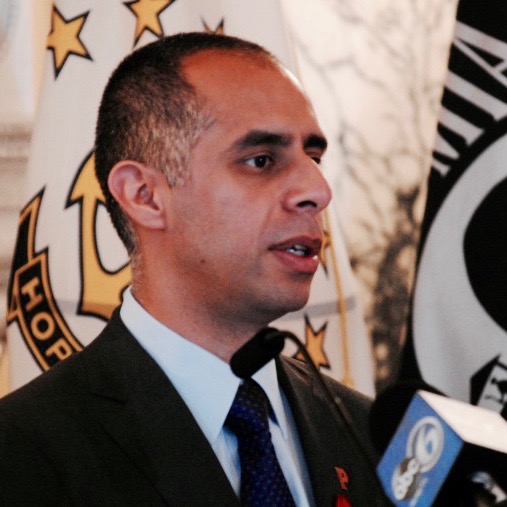 Providence doesn’t need or want an LNG facility, said Mayor Jorge Elorza on Thursday.
Providence doesn’t need or want an LNG facility, said Mayor Jorge Elorza on Thursday.
“With all the information that I have seen on this matter, a liquefied natural gas plant is clearly not in the best interest of the city and I do not want to see the project move forward,” said the first term mayor of the capital city in a prepared statement. “Providence has the opportunity and moral obligation to be leaders in clean, renewable energy and that is the direction our city should move in.”
His statement comes as National Grid explores utilizing an existing LNG storage tank near the Providence waterfront.
“The proposed plant would process liquid natural gas that is extracted through hydraulic fracking, which is devastating to the environment and the surrounding communities,” said Elorza. “Providence does not want to perpetuate or expand fracking, nor do we want to be burdened by the risks associated with a liquefaction plant in Providence.
He added, “There are clear energy policy and market signals at the local, national, and international level telling us that we should be investing in renewable and clean energy. Our future is in projects like Deepwater Wind and investing in clean heating sources like geothermal and electric heat pumps, not more fossils fuels.”
Previously, the Elorza Administration has said National Grid would get no city subsidies for its proposed LNG facility at the Providence waterfront. “Ultimately, the decision on the LNG plant will be up to the federal government, however the City will provide no subsidies if the project moves forward,” said Emily Cowell, a spokeswoman for Elorza.
The Rhode Island Chapter of the Sierra Club then challenged Elorza to make a stronger stand against LNG. “While Elorza is correct in saying the decision will ultimately be made by FERC, we would argue his assertion, ‘the city will have little input into that decision’ is false. The mayor can’t abdicate his responsibility on this. Local officials can be hugely influential on Federal decisions,” the group said in a statement.
Previously, nine Providence legislators took a strong stand against the proposed LNG facility.
]]> Former Providence mayor Joseph Paolino’s media blitz around homelessness should be taken with a grain (or two, or three) of salt. In 2014, Paolino spoke with James Baar at The Projo (“The Seven Deadly Sins of Downtown Providence”, April 29, 2014) to outline his angst over panhandling homeless people and low income bus riders, suggesting a set of recommendations that show the casino magnate and parking lot landlord’s true political center. As I pointed out at the time and more recently, what really stretches credulity about Paolino’s 2014 proposals wasn’t simply their blithe disregard for the poor, but the barking way that Paolino assumed the city could just take up major new financial liabilities without any realistic stream of money to pay for them. With such extravagant ideas as removing Kennedy Plaza entirely, building a giant underground garage under it, and doubling the size of Burnside Park– all while policing the area to get rid of “vagrants” and completely banning potholes (Just “Do it!” yelled Paolino through the voice of Baar), you would think the city must be swimming in money. The kind of money that could, of course, help resolve the root causes of homelessness.
Former Providence mayor Joseph Paolino’s media blitz around homelessness should be taken with a grain (or two, or three) of salt. In 2014, Paolino spoke with James Baar at The Projo (“The Seven Deadly Sins of Downtown Providence”, April 29, 2014) to outline his angst over panhandling homeless people and low income bus riders, suggesting a set of recommendations that show the casino magnate and parking lot landlord’s true political center. As I pointed out at the time and more recently, what really stretches credulity about Paolino’s 2014 proposals wasn’t simply their blithe disregard for the poor, but the barking way that Paolino assumed the city could just take up major new financial liabilities without any realistic stream of money to pay for them. With such extravagant ideas as removing Kennedy Plaza entirely, building a giant underground garage under it, and doubling the size of Burnside Park– all while policing the area to get rid of “vagrants” and completely banning potholes (Just “Do it!” yelled Paolino through the voice of Baar), you would think the city must be swimming in money. The kind of money that could, of course, help resolve the root causes of homelessness.
The 2014 priorities listed by Paolino remain poor uses of city or state funding, but the former mayor’s softer tone on homelessness opens up an opportunity to hold his feet to the fire and demand some changes. Most recently, in an interview with The Projo’s Edward Fitzpatrick, Paolino says he wants the city to avoid the “Giuliani way” of removing homeless people, and look to root causes. Will Paolino stay true to his word?
Here are some things Paolino can back to show that he’s serious.
A parking lot tax, with a refund to housing costs
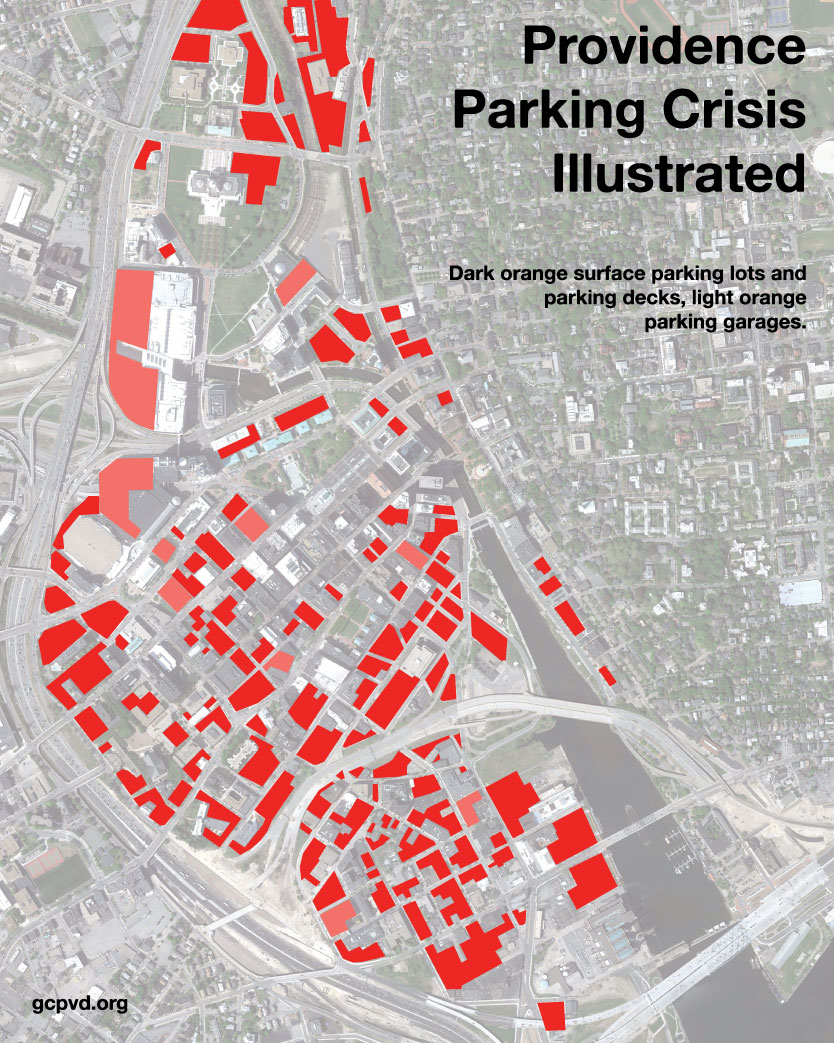
Paolino has large holdings in downtown parking lots. Essentially these are land speculation projects. It makes sense to hold onto prime land in the city, earning money off of commuters who park there, until a perfect skyscraper project comes along for those plots of land. Parking lots do pay property taxes, but because a surface lot is not valued highly, this gives speculators the best of all worlds– an easy short-term revenue stream, low taxes, and a lottery ticket that is likely to be worth a lot of money in the future.
I’ve argued in the past that putting a tax on surface parking would change the balance of this math. Land speculators like Paolino would be inclined to build something– anything– to hold the space until larger projects could come, instead of pimping parking lots. A developer may prefer a skyscraper, and in the long-run that may be the best thing for the city as well, but having rowhouses in the space while something else comes along means people have a place to live. As bigger projects form, the city could also require the continued tenancy of low income residents as part of mixed income development. This could itself help create more affordable housing. A tax on parking could and should also be refunded directly to properties adjacent to the parking, lowering the cost of business and residency in the city. Yet another way that this stream of revenue could considerably change the forecast for the poorest people would be if a portion of it was directly put towards housing vouchers for homeless individuals and families. Paolino has suggested that more money be put to shelters for homeless people, but what people truly need is permanent housing.
A parking lot tax would cost Paolino– he owns 11 lots. But if he’s serious about his statement that the business community needs to step up, endorsing this reform and pushing it through the business community would be one sincere step he could take.
Deregulation of single-family only zoning & parking minimums
Many Providence neighborhoods do not allow affordable housing, by law. The zoning code is full of arcane regulations designed to allow only what types of housing currently exist in a neighborhood. This is nothing like what happened in normal cities before the 1920s.
Providing affordable housing in Providence should partly be built around getting rid of some of these arcane rules.
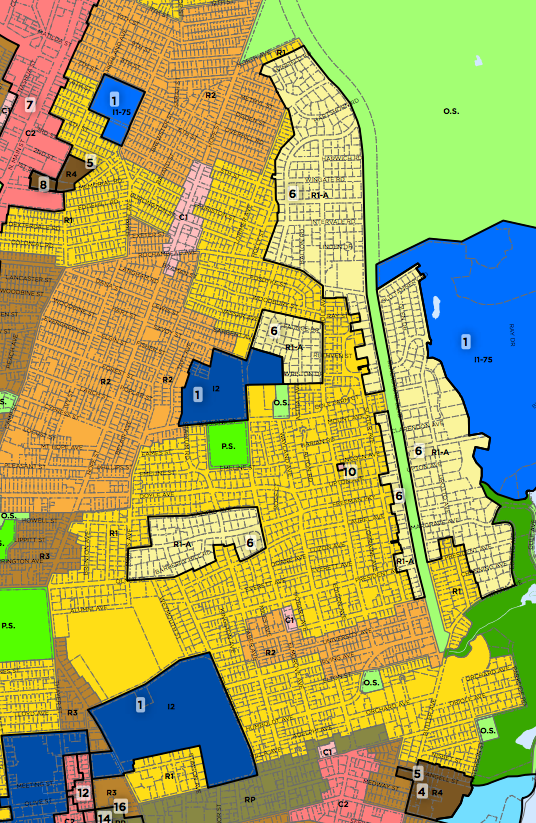
Parking minimums require that most residences have x number of parking spots per square foot of space. This both makes the housing itself more expensive, and also rules out building new housing on land that is taken up by parking.
Providence also has a number of neighborhoods that don’t allow anything but single-family homes. Sometimes these neighborhoods already have some houses that aren’t single-family, and they’ve been carved into the zoning as exceptions. The business community and city need to work together to eliminate zones like 1 & 1A, which don’t allow things like granny cottages, rowhouses, apartments, twins, duplexes, or triple-deckers. The business community and city also have to work together to end the practice of putting residency limits on students. Students bleed out into housing, making what affordable options that exist more expensive, and displacing people on the fringes of becoming homeless.
These are not issues that Paolino can be held accountable for, but in his new-found advocacy for the homeless, they should become centerpieces of policy change. Paolino should push zoning reform.
Transit at the center, not the fringes
While Paolino can’t be blamed for zoning, he can be held accountable for his long agitation against Kennedy Plaza as a bus hub. In 2014, as I stated, Paolino advocated for moving buses “to the fringes of the city” and getting rid of the bus hub entirely, to make it an underground parking garage.
People who become homeless often have serious problems that go beyond job access, but once they get on track, keeping a job is a very important stabilizing force. Transit is one of the most important ways to make sure that low-income people, who cannot afford cars, can have access to jobs.
I’ve had some online discussions with other transit advocates who point out that RIPTA should not be running all its routes through Kennedy Plaza. I agree with this criticism, and think we need an effort to put together a full network of bus routes like what Jarrett Walker designed in Houston, but I also think it’s clear this hasn’t been what Paolino meant in the past. Referring to buses as needing to be “at the fringes” is pretty clear about why the buses need to move– in this case, to take the sour image of poor people out of the downtown. Paolino’s business coalition needs to work to make transit a priority by spearheading efforts to give buses rights-of-way, improving frequencies of bus routes by funding RIPTA better, and updating the city’s poor pedestrian and bike layout to aid last-mile connections.
I’ve argued in the past that while there’s been a lot of action around maintaining free bus passes for elderly and disabled Rhode Islanders, that more attention needed to be put to making the bus system run efficiently and frequently (an argument I borrowed from Jarrett Walker as well). However, even in that piece, I argued that it was silly not to offer homeless people free rides on RIPTA. RIPTA has temporarily extended the free bus pass program pending funding, but business leaders like Paolino need to make RIPTA a long-term priority.
Supporting RIPTA, biking, and walking would be a big turnaround for Joe Paolino, but if he’s truly a reformed man with a vision to end the plight of the homeless, that would be what he needs to do.
And Scrooge was better than his word
I would be lying if I said that I trusted Joe Paolino’s softer messaging on panhandling in Kennedy Plaza. Over the years, many of Paolino’s priorities for the city have struck me as hostile to poor people and to non-drivers, couched in the kind of right-leaning identity politics one might associate more with Donald Trump than a former Democratic mayor of a blue-state city. But everyone can change. I will open my arms to Joe Paolino if he changes his ways. He needs to embrace the end of his parking empire as a way of speculating off of city land, support putting direct tax resources into more affordable housing, back zoning deregulation to stop the experiment of single-family-only neighborhoods, and back a robust RIPTA with bike and pedestrian infrastructure to support last-mile connections. His rhetoric has to move beyond temporary housing for homeless people, and towards permanent solutions.
As Charles Dickens would put it:
Scrooge was better than his word. He did it all, and infinitely more; and to Tiny Tim, who did not die, he was a second father. He became as good a friend, as good a master, and as good a man, as the good old city knew, or any other good old city, town, or borough, in the good old world. Some people laughed to see the alteration in him, but he let them laugh, and little heeded them; for he was wise enough to know that nothing ever happened on this globe, for good, at which some people did not have their fill of laughter in the outset; and knowing that such as these would be blind anyway, he thought it quite as well that they should wrinkle up their eyes in grins, as have the malady in less attractive forms. His own heart laughed: and that was quite enough for him.
God Bless Us Every One.
~~~~
]]>